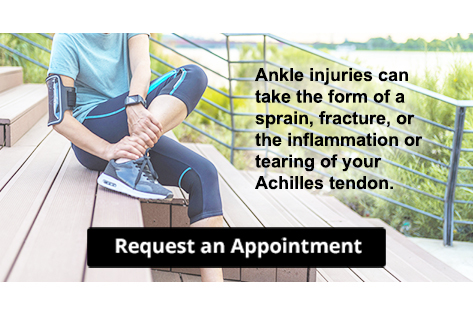Connect With Us
Blog
Items filtered by date: January 2024
Nurturing Your Feet for Fall Prevention
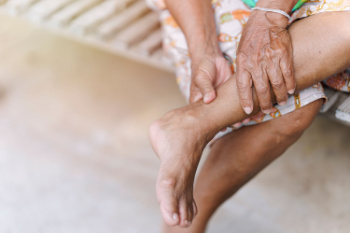
As one ages, the importance of foot care becomes paramount for falls prevention. Start by selecting supportive footwear with slip-resistant soles to navigate slick surfaces with confidence. Regularly inspect your feet for any signs of discomfort, changes, or potential issues that may compromise stability. Moisturize to prevent dryness, as cracked skin may lead to instability. Incorporate gentle stretching exercises to maintain flexibility, enhancing overall balance and coordination. Mindful foot hygiene, including regular washing and drying, helps ward off infections that could affect mobility. Stay vigilant in choosing appropriate footwear for different activities, ensuring a snug fit and proper arch support. By embracing these foot care practices, you can create a solid foundation for fall prevention. Falling can impact the feet, and as these practices are implemented, falling mishaps may be prevented. If you are looking for additional falls prevention techniques, it is suggested that you schedule an appointment with a podiatrist.
Preventing falls among the elderly is very important. If you are older and have fallen or fear that you are prone to falling, consult with Matthew Fillipi, DPM from Practice. Our doctor will assess your condition and provide you with quality advice and care.
Every 11 seconds, an elderly American is being treated in an emergency room for a fall related injury. Falls are the leading cause of head and hip injuries for those 65 and older. Due to decreases in strength, balance, senses, and lack of awareness, elderly persons are very susceptible to falling. Thankfully, there are a number of things older persons can do to prevent falls.
How to Prevent Falls
Some effective methods that older persons can do to prevent falls include:
- Enrolling in strength and balance exercise program to increase balance and strength
- Periodically having your sight and hearing checked
- Discuss any medications you have with a doctor to see if it increases the risk of falling
- Clearing the house of falling hazards and installing devices like grab bars and railings
- Utilizing a walker or cane
- Wearing shoes that provide good support and cushioning
- Talking to family members about falling and increasing awareness
Falling can be a traumatic and embarrassing experience for elderly persons; this can make them less willing to leave the house, and less willing to talk to someone about their fears of falling. Doing such things, however, will increase the likelihood of tripping or losing one’s balance. Knowing the causes of falling and how to prevent them is the best way to mitigate the risk of serious injury.
If you have any questions, please feel free to contact our office located in East Longmeadow, MA . We offer the newest diagnostic and treatment technologies for all your foot care needs.
Get Proper Treatment for Ankle Injuries
The Essence of Proper Foot Health
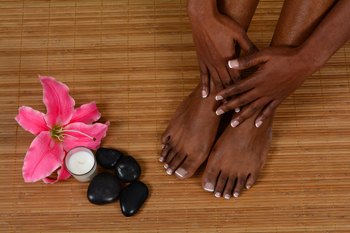
Proper foot health is the cornerstone of overall well-being, laying the foundation for a life of mobility and comfort. At its core, everyday foot care involves maintaining cleanliness and hygiene, with regular washing and drying to prevent infections. It also entails the choice of wearing appropriate footwear, ensuring a balance between comfort, support, and style. Routine inspections for signs of potential issues, such as ingrown toenails or calluses, play a pivotal role in proactive foot care. A regular moisturizing routines prevents dryness and cracking, while fostering skin health. Incorporating gentle exercises and stretches into daily routines strengthens muscles and promotes flexibility, contributing to the prevention of common foot ailments. If you have developed a foot problem that causes pain or discomfort, it is suggested that you make an appointment with a podiatrist.
Everyday foot care is very important to prevent infection and other foot ailments. If you need your feet checked, contact Matthew Fillipi, DPM from Practice. Our doctor can provide the care you need to keep you pain-free and on your feet.
Everyday Foot Care
Often, people take care of their bodies, face and hair more so than they do for their feet. But the feet are a very important aspect of our bodies, and one that we should pay more attention to. Without our feet, we would not be able to perform most daily tasks.
It is best to check your feet regularly to make sure there are no new bruises or cuts that you may not have noticed before. For dry feet, moisturizer can easily be a remedy and can be applied as often as necessary to the affected areas. Wearing shoes that fit well can also help you maintain good foot health, as well as making it easier to walk and do daily activities without the stress or pain of ill-fitting shoes, high heels, or even flip flops. Wearing clean socks with closed shoes is important to ensure that sweat and bacteria do not accumulate within the shoe. Clean socks help to prevent Athlete’s foot, fungi problems, bad odors, and can absorb sweat.
If you have any questions please feel free to contact our office located in East Longmeadow, MA . We offer the newest diagnostic and treatment technologies for all your foot and ankle needs.
The Use of Orthotics Among Aging Runners
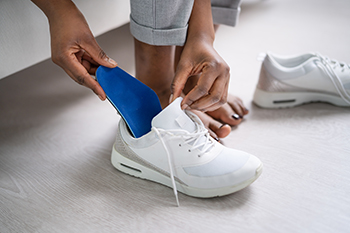
Custom-made orthotics play a vital role in ensuring comfortable and pain-free running for individuals over the age of 50. As we age, the natural wear and tear on our feet and lower limbs can lead to various biomechanical issues and discomfort during physical activities like running. Custom orthotics are tailored to the specific needs of individuals, making them particularly effective in addressing age-related foot problems. One of the primary benefits of custom orthotics is their ability to provide optimal support and alignment for the feet, which becomes increasingly important as people age. These orthotic devices help redistribute pressure evenly across the foot, reducing the risk of common issues like plantar fasciitis, arch pain, and joint strain. Moreover, custom orthotics can correct gait abnormalities and overpronation, which tend to become more prevalent with age. By promoting proper biomechanics, orthotics enhance stability, reduce the risk of falls, and alleviate discomfort associated with running. Custom-made orthotics are designed to fit comfortably inside running shoes, ensuring a snug and supportive fit. This added cushioning and support help absorb shock during each stride, reducing the impact on joints and minimizing the risk of injury. If you are concerned about being able to run comfortably as you age, it is suggested that you schedule an appointment with a podiatrist for a conversation about how wearing custom-made orthotics can benefit you.
If you are having discomfort in your feet and would like to try orthotics, contact Matthew Fillipi, DPM from Practice. Our doctor can provide the care you need to keep you pain-free and on your feet.
What Are Orthotics?
Orthotics are inserts you can place into your shoes to help with a variety of foot problems such as flat feet or foot pain. Orthotics provide relief and comfort for minor foot and heel pain but can’t correct serious biomechanical problems in your feet.
Over-the-Counter Inserts
Orthotics come in a wide variety of over-the-counter inserts that are used to treat foot pain, heel pain, and minor problems. For example, arch supports can be inserted into your shoes to help correct overarched or flat feet, while gel insoles are often used because they provide comfort and relief from foot and heel pain by alleviating pressure.
Prescription Orthotics
If over-the-counter inserts don’t work for you or if you have a more severe foot concern, it is possible to have your podiatrist prescribe custom orthotics. These high-quality inserts are designed to treat problems such as abnormal motion, plantar fasciitis, and severe forms of heel pain. They can even be used to help patients suffering from diabetes by treating foot ulcers and painful calluses and are usually molded to your feet individually, which allows them to provide full support and comfort.
If you are experiencing minor to severe foot or heel pain, it’s recommended to speak with your podiatrist about the possibilities of using orthotics. A podiatrist can determine which type of orthotic is right for you and allow you to take the first steps towards being pain-free.
If you have any questions please contact our office located in East Longmeadow, MA . We offer the newest diagnostic and treatment technologies for all your foot and ankle needs.
Managing Foot Pain During the Third Trimester of Pregnancy
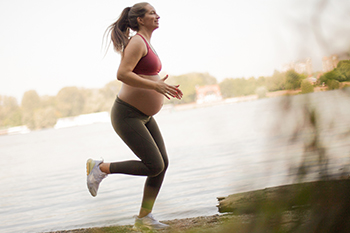
The third trimester of pregnancy often introduces new challenges for expectant mothers, including foot pain. As the baby grows, the added weight places increased pressure on the feet, leading to discomfort and swelling. Hormonal changes further contribute to the relaxation of ligaments, altering the foot's arch and potentially causing pain. Edema, or fluid retention, is a common occurrence in late pregnancy, leading to swollen feet and ankles. The body's increased blood volume and the pressure exerted by the growing uterus on blood vessels can also affect circulation to the lower extremities. Prioritizing comfortable footwear, elevating the feet when possible, and engaging in gentle stretches can provide relief. If you have foot pain during your pregnancy, it is suggested that you consult a podiatrist who can monitor your foot health.
Pregnant women with swollen feet can be treated with a variety of different methods that are readily available. For more information about other cures for swollen feet during pregnancy, consult with Matthew Fillipi, DPM from Practice. Our doctor will attend to all of your foot and ankle needs.
What Foot Problems Can Arise During Pregnancy?
One problem that can occur is overpronation, which occurs when the arch of the foot flattens and tends to roll inward. This can cause pain and discomfort in your heels while you’re walking or even just standing up, trying to support your baby.
Another problem is edema, or swelling in the extremities. This often affects the feet during pregnancy but tends to occur in the later stages.
How Can I Keep My Feet Healthy During Pregnancy?
- Wearing orthotics can provide extra support for the feet and help distribute weight evenly
- Minimize the amount of time spent walking barefoot
- Wear shoes with good arch support
- Wear shoes that allow for good circulation to the feet
- Elevate feet if you experience swelling
- Massage your feet
- Get regular, light exercise, such as walking, to promote blood circulation to the feet
If you have any questions please feel free to contact our office located in East Longmeadow, MA . We offer the newest diagnostic and treatment technologies for all your foot and ankle needs.
Symptoms and Causes of Plantar Warts
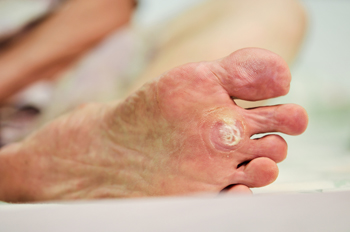
Plantar warts, small growths on the soles of the feet caused by the human papillomavirus, abbreviated HPV, are not only a common ailment but also a source of discomfort for many people. These warts often appear as rough, grainy lesions with tiny black dots, known as seed warts, indicative of tiny blood vessels within. The pressure exerted on the soles of the feet, particularly during walking or standing, can cause plantar warts to embed themselves deeper into the skin, contributing to the characteristic pain associated with these growths. Causes of plantar warts include direct contact with the HPV virus, which thrives in warm and moist environments such as locker rooms or public showers. Understanding the symptoms, such as tenderness or the presence of small, fleshy lesions on the soles, and the potential causes of plantar warts is essential for timely identification and appropriate treatment. If you have developed a plantar wart, it is strongly suggested that you schedule an appointment with a podiatrist who can guide you toward correct treatment methods.
Plantar warts can be very uncomfortable. If you need your feet checked, contact Matthew Fillipi, DPM from Practice. Our doctor will assist you with all of your foot and ankle needs.
About Plantar Warts
Plantar warts are the result of HPV, or human papillomavirus, getting into open wounds on the feet. They are mostly found on the heels or balls of the feet.
While plantar warts are generally harmless, those experiencing excessive pain or those suffering from diabetes or a compromised immune system require immediate medical care. Plantar warts are easily diagnosed, usually through scraping off a bit of rough skin or by getting a biopsy.
Symptoms
- Lesions on the bottom of your feet, usually rough and grainy
- Hard or thick callused spots
- Wart seeds, which are small clotted blood vessels that look like little black spots
- Pain, discomfort, or tenderness of your feet when walking or standing
Treatment
- Freezing
- Electric tool removal
- Laser Treatment
- Topical Creams (prescription only)
- Over-the-counter medications
To help prevent developing plantar warts, avoid walking barefoot over abrasive surfaces that can cause cuts or wounds for HPV to get into. Avoiding direct contact with other warts, as well as not picking or rubbing existing warts, can help prevent the further spread of plantar warts. However, if you think you have developed plantar warts, speak to your podiatrist. He or she can diagnose the warts on your feet and recommend the appropriate treatment options.
If you have any questions please feel free to contact our office located in East Longmeadow, MA . We offer the newest diagnostic and treatment technologies for all your foot and ankle needs.
